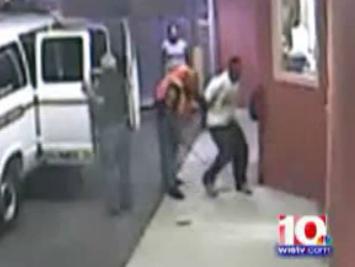SC Deputy Found Guilty for Beating Handcuffed Black Prisoner
/
From [HERE] and [See Video Here] Prosecutors in the case against a former Kershaw County sheriff’s deputy said Thursday afternoon that they were not nervous as jury deliberations dragged into a second day.
In the end, the prosecutors won a conviction against Oddie Tribble, 51, on a federal civil rights charge for beating a handcuffed detainee. After the verdict, Beth Drake, an assistant U.S. attorney in Columbia, said the jury needed time to review a video of the beating and match it with witness testimony. Plus, it is a hard decision to convict a police officer, she said.
“It’s never a good day when a law enforcement officer is convicted of a civil rights violation,” Drake said.
Tribble faces a maximum punishment of 10 years in prison and a $250,000 fine for violating a detainee’s right to be free from excessive force by a law enforcement officer. His sentencing has been scheduled for May 12 in U.S. District Court in Columbia.
Until then, Tribble remains free on bond, and his defense attorneys said they will turn their focus toward minimizing his time in prison and his fine. Tribble did not flinch when the jury’s decision was announced. After the trial, he stood with his family as his defense team addressed the media but declined to comment himself.
The defense team will bring people to the stand during the sentencing hearing to testify about Tribble’s service in the Army and as a 23-year law enforcement officer, said Johnny Gasser, one of Tribble’s three defense attorneys.
“We will demonstrate that what occurred in that 97 seconds was an absolute anomaly in the life of Oddie Tribble,” Gasser said. “He’s a good and honorable man.”
The trial’s focal point was video footage of the Aug. 5 beating that was captured by two security cameras installed in a gated carport at the Kershaw County Detention Center. In the videos, Tribble is seen striking Charles Shelley, who is in handcuffs, with a retractable metal police baton.
After Shelley stepped out of a police van, Tribble hit him until he fell, and then continued to strike him while he was on the ground. The blows broke Shelley’s right leg and bloodied both legs.
Tribble’s defense team had tried to convince the jury that Tribble needed to strike Shelley because the detainee was intoxicated and belligerent and would not comply with orders.
However, the prosecutors proved to the jury that Tribble’s actions were excessive and that he intended to hurt Shelley, who had insulted Tribble and threatened his family during the ride to the jail. They brought an S.C. Criminal Justice Academy instructor to the stand to who said police are not trained to use a baton on handcuffed detainees and that the beating was not justified.
“Oddie Tribble, we believe, snapped,” Drake said. “He’s not an ogre. But it happened, and he’s going to pay for it.”
Shelley, who had attended the four-day trial, was not in the courtroom Thursday. Efforts to reach him by phone afterward were unsuccessful.
During the trial, the jury watched portions of the video at least 11 times.
Prosecutors tried to show the video as little as possible because they did not want the jury to become desensitized to it, Drake said. That’s a lesson prosecutors learned after the 1992 Rodney King beating, when a jury acquitted police officers who were filmed while beating King. Those jurors watched the video so many times during the trial that it had lost its impact, later case studies found.
“We played the video only when we needed to,” Drake said. “We wanted the jury to render a decision based on what they saw in it.”
On the other hand, the defense team showed the video in slow motion as Tribble narrated each sequence to explain his actions.
“The video shows that he definitely beat a man without justification,” Drake said.





































































































































































































































































